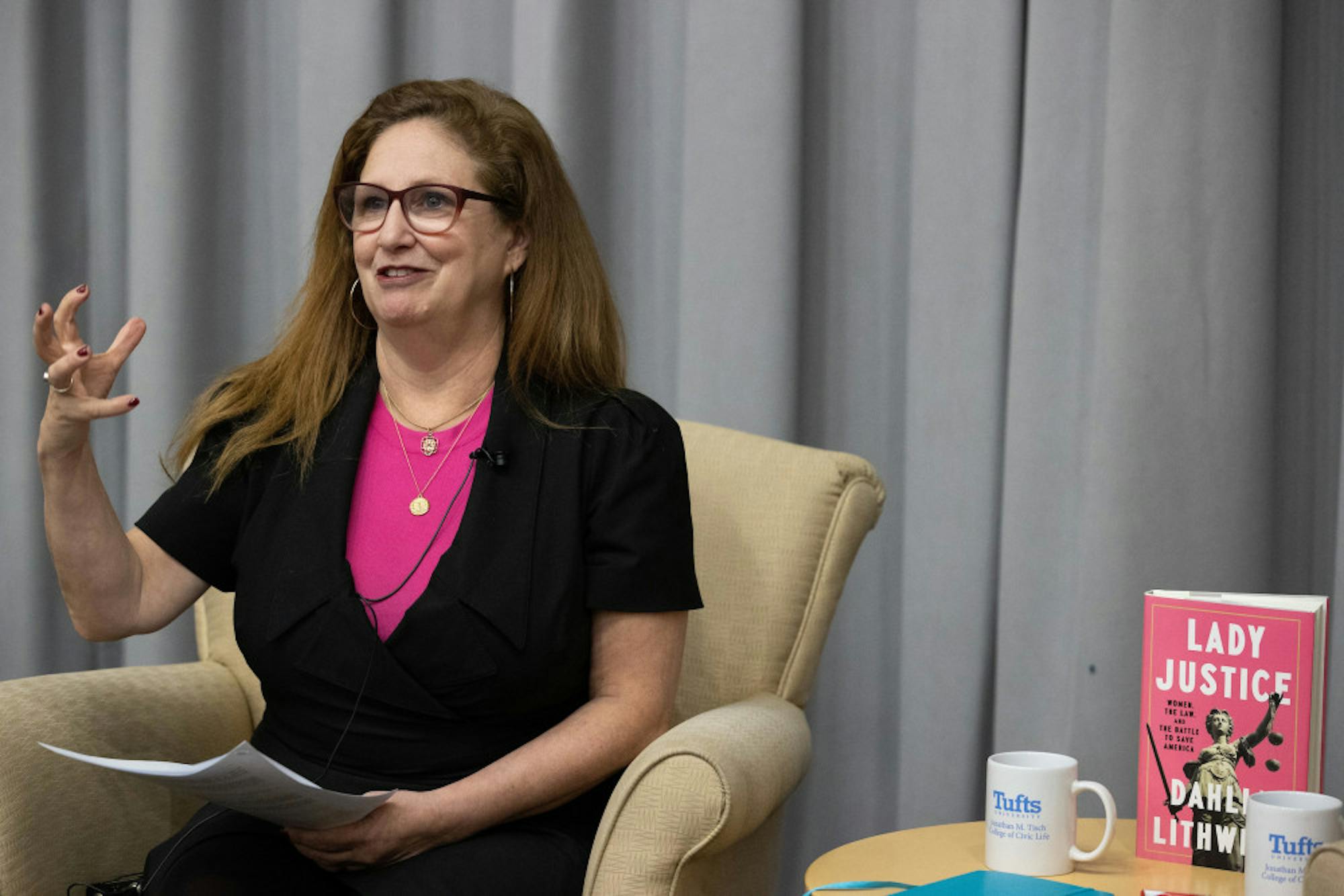Writer and podcast host Dahlia Lithwick visited Tufts as part of Tisch College’s Solomont Speaker Series. In conversation with Dr. Nancy Thomas, founding director of Tisch College’s Institute for Democracy & Higher Education, Lithwick discussed her new book, “Lady Justice: Women, the Law, and the Battle to Save America,” as well as several women who have changed judicial history.
Lithwick, who serves as a senior editor at Slate magazine, is likely most known for her Supreme Court reporting. Having earned her B.A. from Yale University and her J.D. from Stanford Law School, Lithwick soon began writing her popular judicial columns, “Supreme Court Dispatches” and “Jurisprudence.” Lithwick also hosts one of Slate’s popular judicial podcasts, “Amicus” (2014–).
In an interview with the Daily, Lithwick reflected on the opportunity to come speak to a body of college students.
“Right at this moment in history, nothing [is] more empowering for anyone, I think, than talking to students, because it is so abundantly clear that we are failing spectacularly at doing all the things we’re supposed to do,” Lithwick said. “[When] I'm feeling as though we’re on this horrific downward spiral to illiberalism and authoritarianism, unerringly, speaking to students reminds me, ‘Oh, I had it really easy.’”
Lithwick’s most recent book, “Lady Justice,” was an instant New York Times bestseller. Wrapped in a hot pink cover (which Lithwick righteously fought for), the book tells the story of countless female lawyers and organizers who stoked legal justice. For Lithwick, telling these stories is an argument for hope and change.
“I was worried about the ways in which activism around race and gender and crime and immigration was devolving into RBG hagiography,” Lithwick said. “‘If I just buy enough swag, I'm doing justice work.’ … After she died, which happened in the middle of writing the book, there was just this sense of like, ‘Well, it's all over now.’ And I just was like, ‘No, there’s kind of Ruth ‘Baby’ Ginsburgs everywhere.’”
One of these legal icons that Lithwick spotlighted was Pauli Murray, a 20th-century civil rights activist and legal scholar. After being rejected by the University of North Carolina PhD program on account of her race, Murray attended Howard University School of Law, where she penned the paper “Should the Civil Rights Cases and Plessy v. Ferguson be Overruled?” Murray’s framework would underscore much of the legal rationale in Brown v. Board of Education, though Murray was never directly named.
For Lithwick, who learned about Murray’s story long after attending Stanford Law School, this forgotten history serves as a challenge to academic institutions like Tufts.
“I wanted the book to start with Pauli Murray, because how is it possible that every college in the country doesn’t have a Pauli Murray library?” Lithwick said. “And why is this not the first chapter of every single book about race and gender equality in this country?”
In her conversation with Thomas, Lithwick touched on Murray’s story, Ruth Bader Ginsburg hagiography, and much more. In one of the more sobering topics of the evening, Lithwick spoke on her experience of covering Brett Kavanaugh’s confirmation trial.
“My then 14-year-old son, who was watching at school in Manhattan, texted me about half an hour into Judge Kavanaugh’s testimony and said, ‘Are you perfectly safe in there?’” Lithwick said. “Of course I was safe, this was a piece of public performance art, it had nothing to do with justice or truth-seeking, it was just a thing that was happening. At another level, I think I say none of us were actually super safe after that moment.”
After concluding their discussion, Thomas opened up the conversation to questions. One attendee, a student looking to start up a career in tech journalism, asked about breaking into the industry. In her response, Lithwick pointed out the tendency for women to be less confident in their professional abilities.
“It is so striking to me that almost every woman I interviewed for the book had this moment where she was like, ‘I can’t do this, I don’t know this,’” Lithwick said. “Every one of them massively doubted whether she belonged in that space, and part of the reason I needed to write the book is because they all belong in that space.”
More than anything, Lithwick believes “Lady Justice” to be a call to action, and one that extends far beyond the world of lawyers and justices.
“Women have made such huge advances in the world of the law, in the world of politics, in the world of power. So, let's be really protective of that,” Lithwick said. “I think that’s the call to action, because, as it turns out, it’s ephemeral and fragile. Women will go to jail now, because the law has been weaponized against them in this country.”






